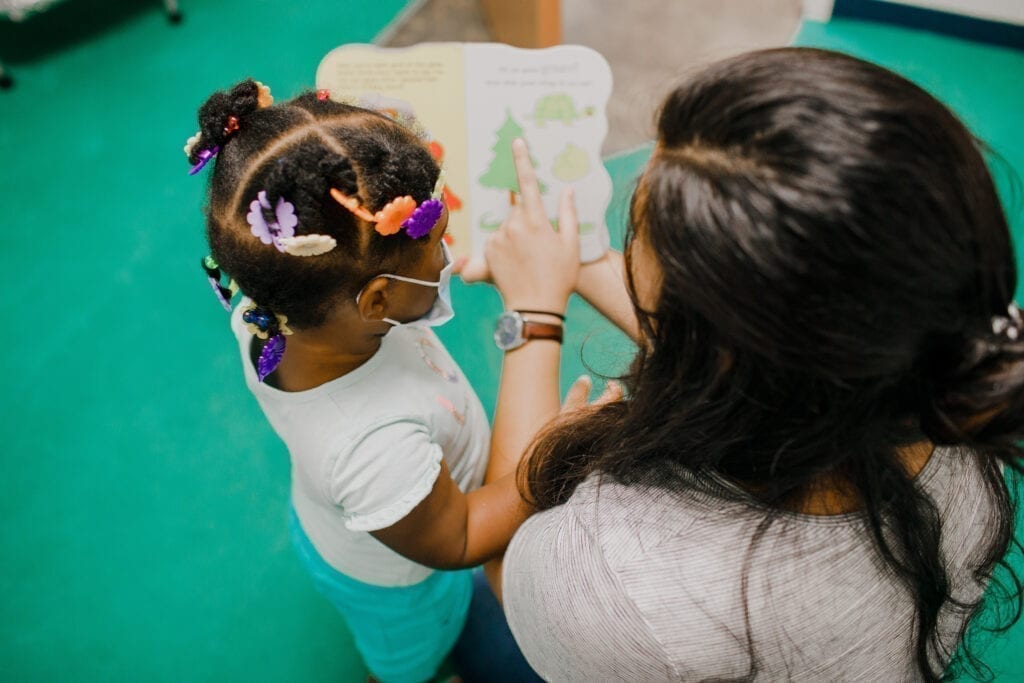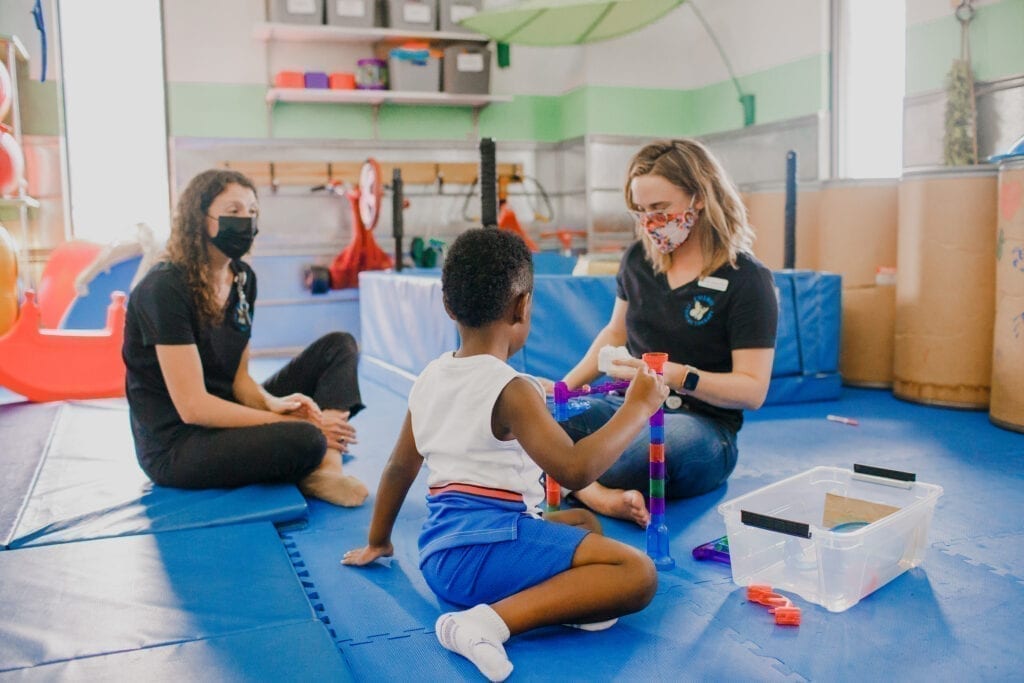Speech-Language Therapy
Our child-centered speech/language programs focus on helping children communicate more effectively. Therapy focuses on improving a child’s ability to comprehend others and express themselves. Emerge’s speech-language pathologists work closely with families to create effective home programs to reinforce communication skills learned during therapy.

Who This Therapy is For?
Speech-language therapy at Emerge can support children with or who are experiencing:
-
-
- Late talking
- Poor articulation
- Autism
- Apraxia of speech
- Stuttering
- Reading and writing deficits
- Differences with social participation
- Tongue or lip tie
- Voice disorders
- Alternate and Augmentative forms of communication (AAC, including device funding and use)
- Difficulties with executive functioning
-
Additional Specialty Services
Orofacial Myofunctional Therapy
Orofacial Myofunctional Therapy (OMT) is used to establish (or re-establish) normal oral rest postures and muscle functions of the mouth. Treatment goals may include: eliminate any harmful sucking habit (thumb-sucking/pacifier/prolonged use of sippy cups), establish nasal breathing patterns, normalize tongue, lip, and teeth resting postures, and improve functional chewing and swallowing.
Reading Therapy
Speech-Language Pathologists make great reading tutors, because they have extensive knowledge of and experience treating many other challenges related to development of reading accuracy, fluency, and comprehension. We have one Speech Therapist in our Durham location with formal training in Orton Gillingham, Visualizing & Verbalizing, and LiPS.
Infant Therapeutic Services
In our Durham location we have one Speech Therapist with training in tethered oral tissues (tongue and lip ties) and feeding for the 6-16 month old. In our Cary location we have one Speech Therapist who tethered oral tissues (tongue and lip ties), infant feeding and is a lactation consultant.
Feeding Therapy
Feeding Therapy with our occupational therapists primarily use the SOS Approach to Feeding to support children who have significantly restricted diets. SOS works to increase the range of foods that a child will eat. This program can be implemented in individual or group settings and includes a significant parent involvement and education component to ensure home carryover.
Parent Coaching
A parent coach can help you navigate the twists and turns of parenting a neurodivergent child, school concerns, IEPs, home routines, challenging behaviors, and therapy carryover at home. They provide you with practical tools, tailored strategies, and expert advice, designed specifically to meet your family’s unique needs!
Transgender Voice Therapy
SLP Amy Munekata offers transgender voice therapy and resources for folks who want to align their voice with their gender identity. You can expect to learn vocal anatomy, pitch, prosody, inflection, resonance, articulation, and nonverbal communication!

Our Approach (methodology)
Emerge is a neurodiversity-affirming clinic. We are play-based, child-led, and use a “sensory lense” to help guide treatment. Each of our locations offers a wide variety of sensory-rich environments. Regardless of the type of therapy, our goal is to find fun and motivating ways to encourage each child. We carefully consider their special interests and unique skill sets when planning treatment sessions. Nearly all our staff have completed some level of training within the DIR/Floortime structure and incorporate concepts and principles into daily practice.
Learn More
Does Your Child Have Delays in Speech and Language Skills?
AT 9 MONTHS, DOES YOUR CHILD:
- Attend to a speaker and pictures.
- Recognize the names of family members.
- Produce several different syllables.
- Vocalize to get attention.
AT 12 MONTHS, DOES YOUR CHILD:
- Understand simple questions.
- Participate in speech routine games (e.g., peekaboo, pat-a-cake).
- Use 1-2 words.
AT 18 MONTHS, DOES YOUR CHILD:
- Have at least ten words.
- Use simple gestures (waves, claps, points).
- Make sustained eye contact and engage your attention.
- Persist in communication attempts to get you to do something.
- Understand a variety of simple words/commands without a gesture.
AT 24 MONTHS, DOES YOUR CHILD:
- Use over 50 words to communicate.
- Use several consonant sounds, including: p, b, m, t, d, n, h.
- Use several two word combinations (daddy car; more cookie).
- Use mostly words to communicate.
- Follow a variety of directions.
AT 36 MONTHS, DOES YOUR CHILD:
- Engage in conversation.
- Use language in imaginative ways.
- Ask questions.
- Use more consonant sounds: k, g, f, t, d, n, m, b, p, h.
- Respond appropriately to yes/no and wh- questions.
- Follows 2-sep directions.
- Use early-developing grammatical markers (plural “s”, “-ing”, etc.)
AT 48 MONTHS, DOES YOUR CHILD:
- Carry on conversations with adult-like grammar.
- Use pronouns: I, me, s/he, you appropriately.
- Ask and answer questions (e.g., who?, how?, how many? why?)
- Engage in complex pretend verbal play.
- Speech is understood by non-family members most of the time.
- Use more consonant sounds: p, d, m, w, h, n, t, b, k, g, f, v, y.
AT 60 MONTHS, DOES YOUR CHILD:
- Participate in long, detailed conversations.
- Talk about past, future, and imaginative events.
- Retell stories or events.
- Follows three-step directions.
- Correctly produce speech sounds: p, d, m, w, h, n, t, b, k, g, f, v, y, s, z, j, th, sh, ch, l.
Understanding School-Age Speech/Language Disorders
Below are some guidelines for speech/language developmental expectations in school-age children:
BY THE END OF 1ST GRADE, A CHILD SHOULD BE ABLE TO:
- Follow 2-3 step directions in order.
- Remember information and respond to instruction.
- Retell stories and events in a logical sequence.
- Correctly produce all speech sounds, including the more difficult r, l, and s sounds.
- Be understood nearly 100% of the time, even by new listeners and in new situations.
- Speak fluently without frequent interruptions or repetitions.
- Start conversations, take turns, and stay on topic.
- Produce rhymes.
BY THE END OF 2ND GRADE, A CHILD SHOULD BE ABLE TO:
- Answer questions about a grade-level story.
- Understand concept words (e.g., time, location, quality, quantity).
- Use complex sentence structures.
- Use language to inform, persuade, and entertain.
- Read and paraphrase a story.
- Explain key elements of a story.
- Organize writing to include a beginning, middle, and end.
- Progress to more accurate spelling.
BY THE END OF 3RD GRADE, A CHILD SHOULD BE ABLE TO:
- Participate in conversations and group discussions.
- Use appropriate vocabulary.
- Predict, justify, compare, and contrast.
- Include details in writing.
- Identify and correct most spelling errors independently.
- Plan, organize, revise, and edit writing.
BY THE END OF 4TH GRADE, A CHILD SHOULD BE ABLE TO:
- Understand and use some figurative language.
- Follow written directions.
- Make inferences from written material.
- Write multi-paragraph stories.
BY THE END OF 5TH GRADE, A CHILD SHOULD BE ABLE TO:
- Plan and make oral presentations geared to a specific audience.
- Maintain eye contact and use appropriate gestures and facial expressions.
- Understand and use root words, prefixes, and suffixes.
- Develop a character and plot.
- Write for a variety of purposes.

